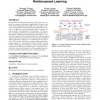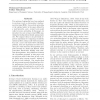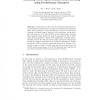509 search results - page 34 / 102 » Compositional Models for Reinforcement Learning |
119
click to vote
ICML
2003
IEEE
15 years 7 months ago
2003
IEEE
Shaping can be an effective method for improving the learning rate in reinforcement systems. Previously, shaping has been heuristically motivated and implemented. We provide a for...
135
click to vote
ATAL
2010
Springer
15 years 3 months ago
2010
Springer
Decentralized reinforcement learning (DRL) has been applied to a number of distributed applications. However, one of the main challenges faced by DRL is its convergence. Previous ...
112
click to vote
CORR
2006
Springer
15 years 2 months ago
2006
Springer
We address the problem of autonomously learning controllers for visioncapable mobile robots. We extend McCallum's (1995) Nearest-Sequence Memory algorithm to allow for genera...
119
Voted
ICML
2002
IEEE
16 years 3 months ago
2002
IEEE
Two notions of optimality have been explored in previous work on hierarchical reinforcement learning (HRL): hierarchical optimality, or the optimal policy in the space defined by ...
124
click to vote
ECML
2004
Springer
15 years 8 months ago
2004
Springer
In this paper, we show how the dynamics of Q-learning can be visualized and analyzed from a perspective of Evolutionary Dynamics (ED). More specifically, we show how ED can be use...



